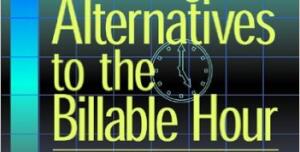Billable Hour: One of the “Most Disruptive” Ideas Ever
 This year marks the 40th anniversary of the U.S. Supreme Court decision Goldfarb vs. Virginia State Bar, which held that lawyer minimum-fee schedules violate federal antitrust law.
This year marks the 40th anniversary of the U.S. Supreme Court decision Goldfarb vs. Virginia State Bar, which held that lawyer minimum-fee schedules violate federal antitrust law.
The decision got scant attention from the press or general public. But lawyers and bar associations were watching closely.
And just like that, the notion of charging your clients for every minute spent on their case was born.
You might have thought time billing has always been a part of law office management. Not so. It is a relatively recent development – and one that is coming under increasing attack as wasteful, inefficient and detested by clients and counselors alike.
Because the billable hour has been such a game-changer, it ranks Number 44 on Bloomberg BusinessWeek’s “85 Most Disruptive Ideas in US History” – right ahead of Air Jordans and behind Napster. Read the entire list here.
Disruption Can Be a Good Thing
Disruptive doesn’t necessarily mean bad. In fact, some of the innovations on the list – Refrigeration (#21) and Motown (#72) – are inarguably good. Others – High-fructose Corn Syrup (#48) and the Cubicle (#14) – not so much. And some – Name-Brand Jeans (#83) and Kitty Litter (#73) – fall into the who-cares category.
Regarding the billable hour, Bloomberg has this to say:
“In the law business, no institution rivals the billable hour in the generation of large-firm partner wealth—or associate misery. The system of multiplying hours (allegedly) worked by a (dismayingly high) rate rewards unproductive behavior, invites abuse, and pits attorneys’ financial self-interest against their clients’ goals, says Steven Harper, a former partner at Chicago-based Kirkland & Ellis who now blogs at the Belly of the Beast. For partners of large corporate firms, the billable hour functions like a cash printing press. That’s because of the magic of leverage. Partners employ armies of associates whom they compensate at levels far below the associates’ billable rates.”
A Brief History Of Time Billing
For most of the 19th century, legal fees were capped by state law. That began changing in the 1900s, as industrialization and increased competition ushered in new ways to charge for legal services. Fixed fees, annual retainers and contingency fees started being used.
But organized bar associations began pushing back, beginning at the state level and quickly moving up to the American Bar Association. They wanted rates to remain fixed and uniform. State and county bars actively encouraged standardized fees. Many published minimum rate schedules.
The issue was couched in ethical, not financial terms. Cutting prices in the name of free-market competition was seen as unprofessional and unseemly. The ABA’s Model Ethical Code went so far as to declare it was ethical for lawyers to “undervalue” their services.
That was all swept away by Goldfarb, which ruled that minimum-fee schedules violated federal antitrust law.
After that, hourly billing became the norm. It held initial appeal because it provided a simple way to show what had been done and how much it cost. It has persisted because it rewards attorneys who find ways to keep the meter running.
Here are some of the other 85 disruptive ideas:
GDP (#85)
Polaroid (#84)
Whiteboard (#82)
Contact Lenses (#81)
Baseball free agency (#79)
Personal fitness (#75)
VCR (#74)
Bar codes (#70)
Starbucks (#68)
Youtube (#66)
Bottled Water (#56)
PowerPoint (#53)
Facebook (#51)
Euro (#49)
Email (#47)
The jeep (#39)
Modem (#38)
Social Security (#28)
Fixed-rate mortgages (#17)
Apple (#10)
Television (#5)
Wal-Mart (#4)
Green revolution (#3)
Microchips (#2)
Jet Engines (#1)
What do you think of this list? What disruptive ideas would you add to it? Drop us a line.
Sources:
- Paul M. Barrett, Bloomberg BusinessWeek http://www.businessweek.com/articles/2014-12-04/how-billable-hours-changed-the-legal-profession
- Bloomberg BusinessWeek http://www.businessweek.com/features/85ideas/
- Rocket Lawyer https://www.rocketlawyer.com/blog/why-the-billable-hour-is-bad-for-lawyers-and-clients-914833
Jay Reeves a/k/a The Risk Man has practiced in North Carolina and South Carolina. Formerly he was Legal Editor at Lawyers Weekly and Risk Manager at Lawyers Mutual. Contact him at jay.reeves@ymail.com.




